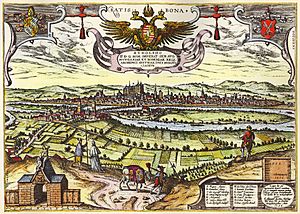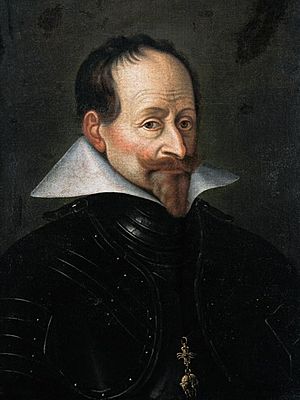Diet of Regensburg (1623) facts for kids
The Diet of Regensburg in 1623 was an important meeting. It brought together leaders from the Holy Roman Empire. Emperor Ferdinand II called this gathering. It wasn't a full "imperial diet" but a special meeting of princes. This allowed the Emperor to make decisions more easily. A big decision was made here: the Electorate of the Palatinate was given to Maximilian I of Bavaria. This meeting showed how powerful the Emperor was during the Thirty Years' War.
Contents
Why Was the Meeting Held?
This meeting happened because of a major conflict. The Thirty Years' War had been going on since 1618. One of the main figures was Frederick V. He was a powerful prince, known as an Elector. Electors were princes who chose the Holy Roman Emperor.
Frederick V had rebelled against Emperor Ferdinand II. He was involved in the Bohemian Revolt (1618–1621). Because of his actions, the Emperor declared him an "outlaw" (placed him under the imperial ban). This meant Frederick lost his rights and lands.
Frederick's lands in the Rhine Palatinate were taken over. This was done by the army of Philip IV of Spain, a cousin of Emperor Ferdinand. Frederick's allies were also defeated in battles. These included the Battle of Wimpfen and the Battle of Höchst in 1622. It seemed the Emperor and his allies were winning the war.
Emperor Ferdinand wanted to make Frederick's loss of power official. He wanted the most important princes to agree. So, on July 27, 1622, he called for this special meeting in Regensburg.
Who Attended the Regensburg Meeting?
Emperor Ferdinand arrived in Regensburg on November 24, 1622. Other important leaders joined him. These included the Archbishops and Electors of Mainz and Cologne. The Elector of Trier sent representatives because he was ill.
Many Protestant rulers did not come in person. The Electors of Saxony and Brandenburg sent people to represent them. They were attending a funeral instead. The only major Protestant ruler who came in person was Ludwig of Hesse-Darmstadt. The meeting was delayed until January 10, 1623. This was in hopes that more Protestant princes would come.
Important foreign visitors were also there. The Spanish ambassador, Count Oñate, attended. The Pope's representative, Carlo Carafa, was also present.
What Was Discussed at the Meeting?
The Emperor presented several topics for discussion. He wanted to find a way to bring lasting peace after the Bohemian Revolt. They also talked about how to pay for defenses against the Ottoman Empire in Hungary. Other topics included security near the border with the Dutch Republic. The Dutch were fighting a war with Spain at the time. They also discussed legal issues within the Empire and how to control rising prices (inflation).
The most important and difficult topic was Frederick V's title. The Emperor wanted to take away Frederick's Elector title. He wanted to give it to Duke Maximilian of Bavaria.
- Support for the transfer: The Pope's representative strongly supported this. It would mean more Catholic princes would choose the next Emperor.
- Opposition to the transfer: Protestant princes were against it. The Archbishop of Mainz and the Spanish ambassador also opposed it. They believed it would make peace harder to achieve.
Eventually, a compromise was reached on February 21. The Elector title would go to Maximilian. But it would only be for his lifetime. It would not be passed down to his family forever.
The Protestant princes agreed that Frederick had broken the law. But they argued that changing the Elector title needed everyone's agreement. They also said that peace would only come if the Emperor showed mercy. They suggested giving Frederick's German lands back to his heirs. They also asked for forgiveness for Bohemian Protestants.
The Emperor refused to forgive everyone. He asked the princes to write down their answers. He decided to discuss funding for the Hungarian border later. Since no single answer could be agreed upon, three different responses were given:
- One from the Catholic princes.
- One from the representatives of Saxony and Brandenburg.
- One from the Landgrave of Hesse-Darmstadt.
The Catholic princes agreed that Frederick should lose his Elector title. But they said he could be forgiven if he formally submitted to the Emperor. They suggested a future meeting to decide about his lands. Saxony and Brandenburg still felt the title change would make peace difficult. The Landgrave of Hesse-Darmstadt said the Elector title was a matter for all Electors. He also asked for Protestant churches in Prague to be reopened for peace.
The Emperor agreed to show mercy to Frederick if he submitted right away. But he insisted that Frederick had lost his right to be an Elector forever. He said that who would inherit Frederick's lands would be decided later. The Elector title was given to Maximilian. However, it would return to Frederick's heir after Maximilian's death.
What Were the Results?
Maximilian officially received the Elector title. This happened in a ceremony on February 25, 1623.
Frederick of the Palatinate's children were grandchildren of James I of England. Because of this, people expected England to get more involved in the Thirty Years' War. This later led to England sending troops to help Christian IV of Denmark in 1627.
 | Sharif Bey |
 | Hale Woodruff |
 | Richmond Barthé |
 | Purvis Young |



